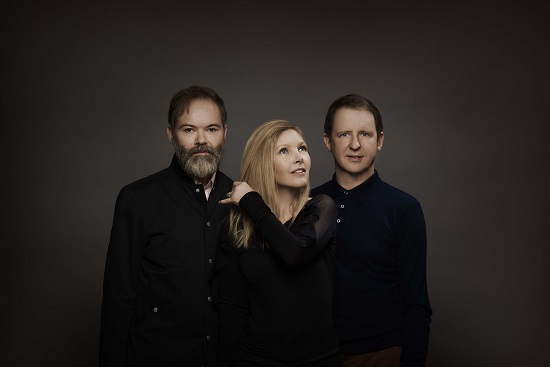There is an unusual parallel between Saint Etienne and Twin Peaks. June 2 sees the release of the band’s new album, Home Counties, coinciding with the premiere of the long-awaited third series of David Lynch’s masterpiece TV series just a couple of weeks earlier.
Further still, the band were formed in 1990, the same year the first series of the show debuted. All this is coincidental, of course – "It would be a slightly odd thing to plan," – says the band’s Pete Wiggs.
However while there is no grand Lynchian conspiracy at work here, the parallels between the two go further than a couple of coincidental dates. The work of Twin Peaks composer Angelo Badalamenti, in particular, has had a lasting impression on the group.
Nowhere has this ever been more apparent in Saint Etienne’s back catalogue than on ‘Breakneck Hill’, an instrumental from the new album premiering with tQ above, which bears many of the composer’s hallmark atmospherics.
Below, Wiggs speaks to tQ about the lasting influence of Badalamenti and Lynch on Saint Etienne throughout their career, and the parallels of using their work to find hidden depth in the respectively pedestrian (on the surface) environments of the British Home Counties and the small American town of Twin Peaks.
Photo by Rob Baker Ashton
What was your first contact with Angelo Badalamenti’s work?
I saw Blue Velvet at the cinema when it came out, Bob and I had been into David Lynch since watching Eraserhead on video a few years before. Blue Velvet was probably the most disturbing thing I’d ever seen, the music really added to the dreamlike atmosphere of the film.
Was there an immediate appeal, or did it seep in over time?
I think it was cemented when Twin Peaks came out, we were really looking forward to it coming out on TV, most made for TV shows were pretty crappy in those days and the idea of David Lynch making TV was exciting. Jeff Barratt (heavenly records) had somehow seen an episode already and said how amazing the Julee Cruise music was. But right from the start the Angelo Badalamenti theme was electrifying.
‘Breakneck Hill’ sounds like it bears a Twin Peaks influence, but is Badalamenti’s presence felt on the rest of the album?
‘Breackneck Hill’ wasn’t consciously Twin Peaks inspired but I had recently re-watched and closely listened to the soundtrack of Blue Velvet for an essay I was writing, so it must have influenced me. It’s hard to say if his presence is felt elsewhere, maybe Sweet Arcadia has a hint of it.
What about in your back catalogue? Are there any particular periods in which you were particularly under Lynch or Badalamenti’s influence?
I’m sure there’s more but our cover of ‘My Christmas Prayer’ and ‘No Rainbows’ for me come to mind. We were really into the Twin Peaks soundtrack when making our first two albums – I think it influenced a lot of the instrumental decisions, moods and chord changes. I don’t know if its directly a David Lynch influence but we have always been into contrasting darker lyrics say with upbeat music and vice versa. On our latest record ‘Underneath the Apple Tree’ is actually the place where Sarah’s family buried their dead pet cats. The mental pictures we have when writing story based songs (e.g. Burnt Out Car, Erika America) have a great debt to filmmakers like Lynch.
Does the new album try to find a hidden depth to the Home Counties as an environment, in the same way Lynch does of the town of Twin Peaks?
Whilst the stories aren’t as dark or twisted as some of Lynch’s, there’s definitely an element of giving a different take on the area. ‘Breakneck Hill’ was a nickname for a hill in Reigate’s Priory Park that as schoolkids we would dare each other to run up; several others had dared and broken necks and other bones, so the legend went. I was pretty terrified by it at age 6 and have a David Lynch like image of it clearly printed in my mind all these years later. I went back to look at it a couple of years ago and it’s an easily manageable and fairly unremarkable slope.
What else were you taking in during the creative process of the new album?
Bob and I had just finished compiling ‘English Weather’ and had been listening to a lot of late sixties, early seventies psyche and prog tinged music, and had started researching its French counterpart, so a lot of that music was fresh in our minds.
Do you want to celebrate the ‘pedestrian’ on the new record?
‘Sweet Arcadia’ gives an almost epic voice to the inhabitants of ‘the plotlands’, tracts of farmland given way to makeshift communities of prefab and self-built homes. The inner sleeve of the album depicts a parade of shops that both Bob and I would spend what seemed like eternities hanging around outside waiting for our mums to finish
shopping and nattering. A lot of things that annoyed you in your youth can now be seen as things that led to who you are now and what you like and dislike. You could call it a love hate relationship but it’s easier to appreciate things with distance. Pedestrian sometimes has a charm to it and can be the opposite of slick and flashy, like comfort food or a relative that you are allowed to slag off but would be offended if anyone else did.


